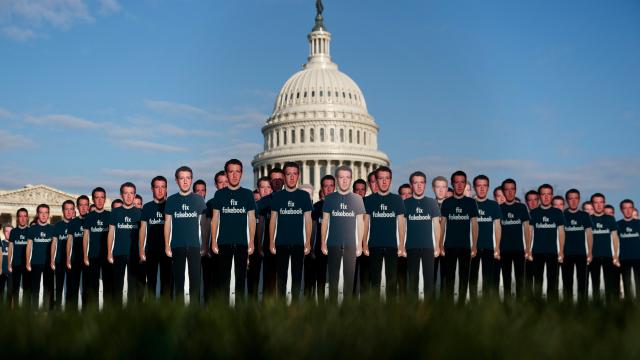If you’ve ever argued that Facebook has become the Ma Bell or, worse, the Standard Oil of our generation, you’re going to love what Chris Hughes has to say. The Facebook co-founder just published a lengthy and extremely convincing argument for breaking up Mark Zuckerberg’s empire. It’s laden with historical context, and there’s even a vague reference to the movie A Beautiful Mind, starring Russell Crowe. Go read it now.
Don’t be scared if you think the essay is too long or that you’re tired of hearing about how bad the Cambridge Analytica scandal was. Hughes’s opinion piece is part of the Privacy Project in the New York Times, although it’s as much a cautionary tale about the future of commerce and democracy as it is a riff on Zuckerberg’s invasive approach to your digital life. Hughes bemoans the lack of oversight into hugely powerful companies, like Facebook, and warns that in continuing to do so, the government is doing a terrible disservice to the American way. He writes:
In the past 20 years, more than 75 per cent of American industries, from airlines to pharmaceuticals, have experienced increased concentration, and the average size of public companies has tripled. The results are a decline in entrepreneurship, stalled productivity growth, and higher prices and fewer choices for consumers.
The same thing is happening in social media and digital communications. Because Facebook so dominates social networking, it faces no market-based accountability.
Breaking up Facebook, Hughes says, would mean compelling the company to spin off Instagram and WhatsApp, acquisitions he says never should have been approved in the first place. With those companies once again serving as competitors to Facebook, there might be a chance that competition could return to the social media industry, where a major new company hasn’t appeared on the scene since 2011.
Since WhatsApp has 1.6 billion active monthly users and Instagram has 1 billion, they’d be formidable competitors, too. This just might put a check on what Hughes calls “Mark’s unilateral control over speech.”
Zuckerberg is free to censor or manipulate the speech of billions, and nobody in the government has stepped up to stop him. Hughes writes:
Mark alone can decide how to configure Facebook’s algorithms to determine what people see in their News Feeds, what privacy settings they can use and even which messages get delivered. He sets the rules for how to distinguish violent and incendiary speech from the merely offensive, and he can choose to shut down a competitor by acquiring, blocking or copying it.
It gets worse:
Mark is a good, kind person. But I’m angry that his focus on growth led him to sacrifice security and civility for clicks. I’m disappointed in myself and the early Facebook team for not thinking more about how the News Feed algorithm could change our culture, influence elections and empower nationalist leaders. And I’m worried that Mark has surrounded himself with a team that reinforces his beliefs instead of challenging them.
Bear in mind that this is Zuckerberg’s college roommate, one of the three co-founders of Facebook. Hughes, who was originally known as “the Empath” at Facebook, was one of the original members of the News Feed team. He says hasn’t worked at the company in a decade and liquidated his Facebook shares in 2012. His involvement and stake in Facebook has also made Hughes fabulously wealthy.
Forbes lists his net worth at $674 million, though that figure is a little over two years old.
Still, the 35-year-old’s argument can’t be ignored. In illustrating Zuckerberg’s frightening amount of power, Hughes points out that his message history with his old friend Mark is now “just a long stream of my own light-blue comments, clearly written in response to words he had once sent me.” This is because Facebook deleted messages sent by Zuckerberg and other Facebook executives in the wake of the Cambridge Analytica scandal.
(After months of revolt, Facebook eventually gave users the ability to do this, too.)
It nevertheless feels like Hughes’s warning that Zuckerberg’s power to censor and control speech on the Facebook platform, where the vast majority of the social media activity takes place, is something that lawmakers should take more seriously.
Who knows what good another great argument to break up Facebook will do. Senator Elizabeth Warren has been leading the charge to break up big tech companies as part of her 2020 platform, and if she’s successful in her campaign to become president, maybe we’ll make some progress. Meanwhile, the Federal Trade Commission (FTC) favours new privacy legislation to help keep Facebook and other tech companies in check.
Mark Zuckerberg himself has said that he would welcome more regulation in the tech industry, although he’s quick to point out that Facebook is already self-regulating. Hughes says that Zuckerberg’s apparent willingness to accept regulation is really just “an attempt to head off the argument that regulators need to go further and break up the company.”
So break up Facebook. As Hughes points out, the United States broke up Standard Oil, competition increased, the companies that spun off succeeded, and the American people won. It happened again when Congress broke up Ma Bell. It should happen again when the government breaks up Facebook.
